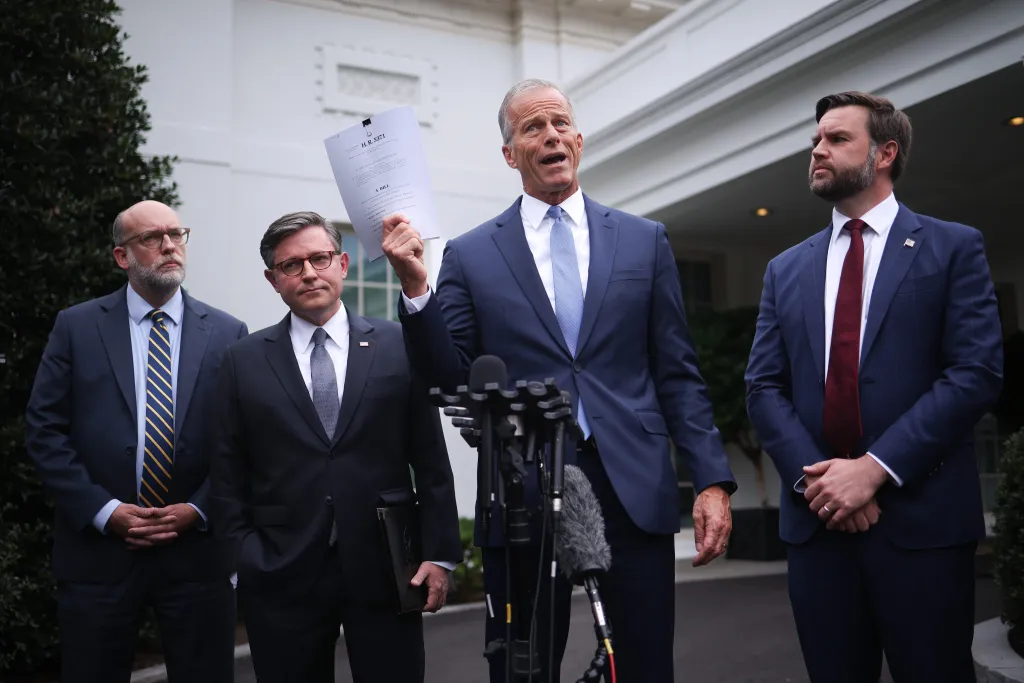
WASHINGTON — Chicago-area Democrats in Congress, many of them spoiling for a fight with President Donald Trump, are preparing for a high-stakes showdown with Republicans that could indefinitely halt most of the day-to-day work of the federal government starting Wednesday.
The combative stance toward the Trump administration is familiar ground for Illinois progressives, but now U.S. Sen. Dick Durbin, a longtime Senate institutionalist who regularly praises bipartisanship in the upper chamber, seems ready to join them.
Durbin could be key to how long a shutdown lasts or whether it happens at all. Illinois’ senior senator reluctantly sided with Republicans on a spending bill this spring, saying shutting down the government would do more damage than agreeing to the GOP’s demands. That vote outraged many liberal activists and the 80-year-old Durbin announced weeks later that he would not seek reelection.
But with Republicans needing seven Senate Democratic votes to avoid a filibuster, Durbin this time around — just days before the shutdown would begin Wednesday — seems unlikely to accept Republicans’ take-it-or-leave-it approach.
“I stand ready to negotiate in good faith with my Republican colleagues to keep our government running and to address the rising cost of health care, but I will not rubber-stamp the president’s extreme cuts to the essential programs that Americans rely on,” Durbin said when voting against the Republican spending plan earlier this month.
Like many Democrats, Durbin wants a new spending agreement to stave off a series of changes in federal law that could soon increase the cost of health insurance for millions of Americans, particularly those in the middle class who use Obamacare insurance marketplaces, and lead to as many as 7 million people losing health coverage outright.
“Republicans have now pushed us to the brink of a government shutdown by proposing (legislation) that increases health care costs for millions of Americans,” he said. “Yet again, Republicans have shown that their loyalty is to President Trump and billionaires, not the constituents they represent.”
Illinois’ other Democratic senator, U.S. Sen. Tammy Duckworth, also called for Republicans to address health insurance costs in their spending plan.
“Millions are set to be kicked off their coverage completely as a direct result of Republicans’ actions,” she wrote in a statement. “Our bill is a life-raft for millions of Americans, but Republicans still care more about what Donald Trump wants than what’s best for our nation.”
“Republicans control the House, the Senate and the White House,” Duckworth added. “If they choose to keep going at this alone, they will only have themselves to blame for any shutdown they cause.”
Poisoned partisan atmosphere
But even with a dramatic shutdown, there’s no telling how much — if anything — Democrats will be able to win from the GOP majorities who control Congress.
Budget negotiations have all but stalled on Capitol Hill ahead of the new fiscal year, which starts Oct. 1. Congressional Republicans are pushing a temporary measure that would keep federal agencies operating at current funding levels until mid-November. But Democrats balked in part because Trump’s team has flouted long-standing rules on spending.
Republicans have, in fact, made little effort to gain Democratic support for their temporary budget fix.
The distrust between the parties goes back to the spending package Republicans passed this spring with the help of Durbin and other Democratic leaders.
After it passed, Republicans have used several tactics to back out of financial commitments spelled out in that law. They eliminated money for public radio and TV and billions of dollars in foreign aid, using a procedure that did not require Democratic support. And the Trump administration — with the support of the conservative majority of the Supreme Court — proposed further foreign aid cuts just weeks before the end of the federal fiscal year, giving Congress virtually no time to object.
Republicans also passed a massive long-term budget policy law this summer that includes major cuts for top Democratic priorities such as Biden-era clean energy incentives, food stamps and Medicaid health insurance coverage for lower-income Americans. The “One Big Beautiful Bill Act” also extends tax breaks for wealthy people and includes funding for a massive expansion of Immigration and Customs Enforcement.
In the current budget standoff, the House passed a GOP spending plan late last week with no intention of returning until after the shutdown deadline had passed.
The first bipartisan meeting of legislative leaders to address the spending deadline was Monday, but no apparent progress was made with Senate Majority Leader John Thune of South Dakota dismissing Democratic calls for health care changes.
“As of right now,” the Republican leader said at the White House, “this is a hijacking of the American people, and it’s the American people who are going to pay the price.”
Before the meeting Monday, Trump repeatedly attacked Democrats, writing on social media that “the Minority Radical Left Democrats” were making “unserious and ridiculous demands.” In a rambling post, the president characterized the Democratic demands to preserve health care coverage to “continue free healthcare for Illegal Aliens” (even though undocumented immigrants are not eligible for Medicaid) and “and essentially create Transgender operations for everybody” (although the Democratic proposal doesn’t address transgender medical treatment).
The president’s budget office drew up plans to institute mass layoffs at federal agencies in the event of a shutdown, an unprecedented move that could violate civil service laws.
Outside of budget negotiations, Trump has shown little interest in the traditional give-and-take that leads to bipartisan agreements on major issues such as the federal budget.
In recent weeks, as Trump’s approval ratings have slid, the president repeatedly ratcheted up pressure on Democratic officials and their constituents.
He deployed National Guard troops to Washington, D.C., while promising to send troops to Memphis and Portland, Oregon. His administration stepped up immigration enforcement nationwide, particularly in the Chicago area. After a shooter killed ICE detainees in Dallas last week, the Department of Homeland Security blamed several Democrats by name — including Illinois Gov. JB Pritzker, Chicago Mayor Brandon Johnson and three Illinois members of Congress — for “inciting” a “surge in assaults on agents and a wave of Radical Left terror.”
Meanwhile, Trump targeted many of his political opponents.
The president is trying to remove a governor on the Federal Reserve, has already ousted members of the Federal Trade Commission and cheered efforts by his political appointee to knock comedian Jimmy Kimmel off the air.
Most brazenly, Trump publicly ordered Attorney General Pam Bondi to pursue criminal charges against the president’s political enemies. Shortly afterward, a new U.S. attorney in Virginia secured an indictment accusing former FBI Director James Comey of lying to Congress five years ago.
“The Department of Justice has become a political tool of a vengeful president,” said Durbin, the top Democrat on the Judiciary Committee. “Is there one Republican left in Washington who gives a damn?”
That leaves many top Democrats and liberal groups calling for a shutdown to stymie Trump’s power grabs.
“This Trump regime is tearing down our institutions,” said Kathy Tholin, chair of the Indivisible Chicago Alliance, a grassroots progressive group. “It’s destroying the supports that people count on to live their lives, to pay for their food, to pay for their health care, to have basic freedom. What we need from our elected representatives is for them to recognize that crisis and to fight like hell to protect us.”
“We’re in the middle of a hostile takeover of government,” she added, “and we need our elected officials — and that means our senators in Illinois — to draw a line and refuse to fund a war against Americans.”
Political positioning
Many elected Democrats, including those vying to replace Durbin in the Senate, seem eager for a budget fight.
Lt. Gov. Juliana Stratton has been especially vocal on the matter. She opposed Durbin’s vote to support the Republican spending package in March and said she does not support U.S. Sen. Chuck Schumer of New York remaining as the leader of the Senate Democratic caucus because of his support of the March spending bill.
Earlier this month, Stratton called for congressional Democrats to “shut the place down” because she said Trump was a “wannabe dictator” and congressional Republicans could not be trusted.
“Democrats cannot give a single vote to a budget that fails to include simple asks to protect healthcare and end Trump’s illegal pocket recissions,” she explained in a follow-up email to the Tribune, referring to the last-minute cuts the president is trying to make. “If they do, they’re complicit.”
“Republicans have the ability to end this showdown, but they would rather cause more harm to American families and capitulate to Donald Trump — who said up front there should be no negotiations — than step up and govern. It’s not up to Democrats to bail them out,” she added.
The other two major Democratic candidates for Durbin’s seat, both members of the U.S. House, also urged their colleagues to take a hard line in negotiations.
“Donald Trump and Republicans control every single branch of government,” said U.S. Rep. Raja Krishnamoorthi, “Come to the table and propose a budget that doesn’t hurt our state. It’s that simple.”
U.S. Rep. Robin Kelly, who represents a district that sprawls from Chicago into the south suburbs, said, “I won’t write blank checks to Donald Trump while he is gutting health care, raising costs at the pharmacy and grocery store, and waging war on our cities.”
A shutdown and then what?
Congressional Democrats are demanding a high price for a short-term deal, but that approach is rarely successful, said E.J. Fagan, a political science professor at the University of Illinois Chicago.
In 2013, for example, U.S. Sen. Ted Cruz, a Texas Republican, led an effort that shut down the federal government for 16 days in a long-shot gambit to defund President Barack Obama’s signature health care law. It didn’t work.
Trump himself demanded funding for a “border wall” in 2018, but congressional Democrats did not relent. Trump gave in after a 35-day standoff that became the longest federal shutdown in history.
“Every time this happens, there are essentially intraparty reasons that one side is demanding a shutdown knowing that they’re not going to win, knowing they’re going to have to settle, and that clean (continuing resolution) is almost certainly the outcome,” Fagan said.
Many factors, he said, are working against the Democrats’ approach.
The first is that the legislation Republicans have advanced is a relatively innocuous bid to give Congress more time to reach a larger agreement. It has fewer “poison pills” in it than the March spending package that Durbin and other top Democrats ultimately supported, Fagan noted.
Democrats are trying to make the current debate about health care costs, but the changes they’re worried about won’t take effect until the beginning of 2026, well after the short-term spending bill expires, Fagan said. In other words, Congress will have to have another spending debate before the year ends when Democrats can bring up this issue again.
Meanwhile, other complaints Democrats have about the budget process are lost in the public messaging.
“The idea that the Trump administration is running rampant, ignoring law, letting things be tied up in court for a year or longer before the Supreme Court says anything about it and (Democrats) are not going to vote for an appropriations bill unless there’s some language in there to force (the administration to follow the law), I think is a coherent argument that they could make,” Fagan said. “They’re just not doing it. It’s a hypothetical that’s not occurring.”
But there are also negative repercussions that Democrats could face if their shutdown strategy fails to move Republicans.
If the Democrats hold out too long, Senate Republicans could opt to end the filibuster for appropriations bills. That would mean it would only take 51 votes to pass the Senate instead of the current 60 votes, which in practice gives Democrats a say on spending-related matters. Both parties have weakened the filibuster — particularly as it comes to confirming presidential nominees — over the last decade, but eliminating it for spending bills would have major consequences, Fagan said.
“Democrats are out of power,” Fagan said. “It would be a massive strategic mistake to give up that power. Once that filibuster is gone, you’re just a minority party and you don’t have veto power over appropriations bills.”
If Republicans go it alone on spending bills, they can insert provisions that, for example, coerce states and cities to cooperate with federal immigration enforcement, Fagan said.
But they could also wipe out all sorts of bipartisan agreements that are carried over from year to year to make sure spending bills pass the Senate.
If Democrats support a spending agreement that keeps those longstanding provisions, it could help their constituents in case the Trump administration tries to flout the law, Fagan said.
“The Trump administration is going to do what they’ve been doing, which is breaking the law and not spending money selectively,” Fagan said. “But if I’m the Democrats, that’s better than giving the other side the authority to make new laws, right? That’s a very different world.”
The high stakes will likely lead Democrats to back down, Fagan predicted.
“Fast-forward two weeks from now, the government has been shut down. Lots of people aren’t getting paid. National parks are closed. Democrats are making a weird, nongermane ask that isn’t really playing in the media, and then they have to cave,” he said. “That’s going to be demoralizing.”
“There are real harms to overasking,” Fagan said, “and I think that, ultimately, they’re going to look stupid after the shutdown. They would be smart to do what they did in March: find some votes, quietly stomach a deal, negotiate with Republicans for what they can get and go beat them in the next election.”
Vock is a freelance reporter based in Washington, D.C.



